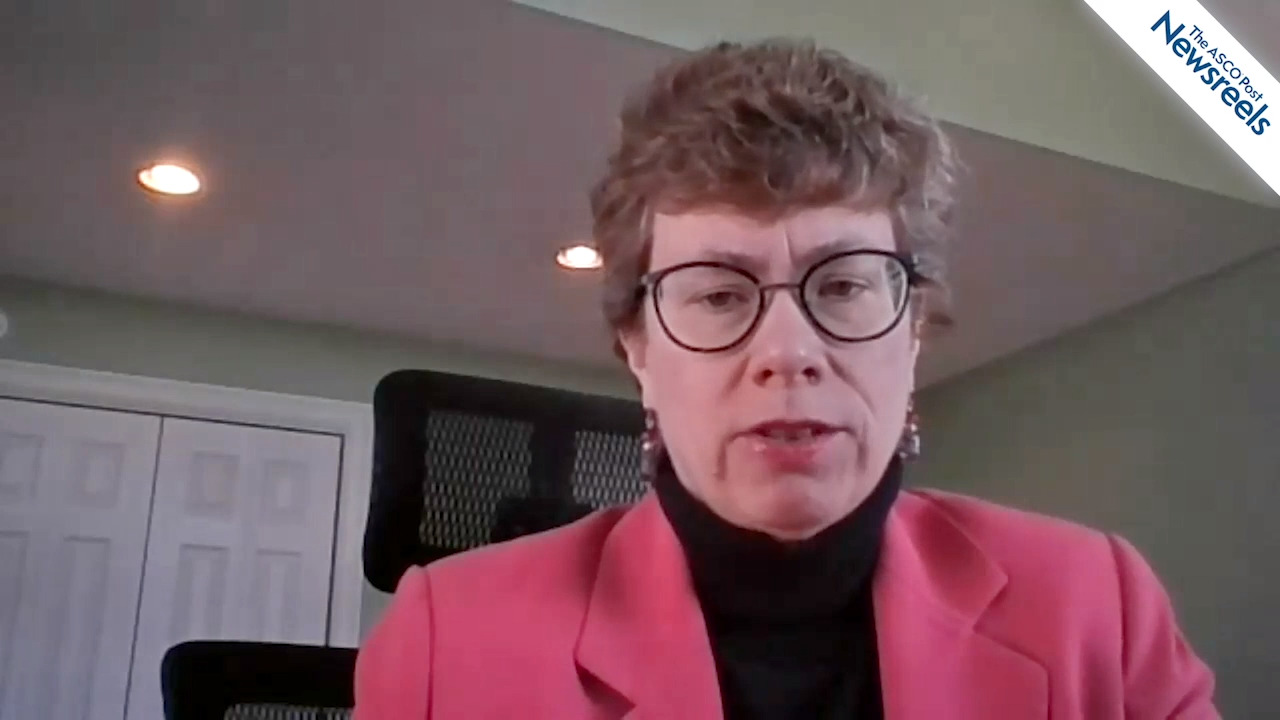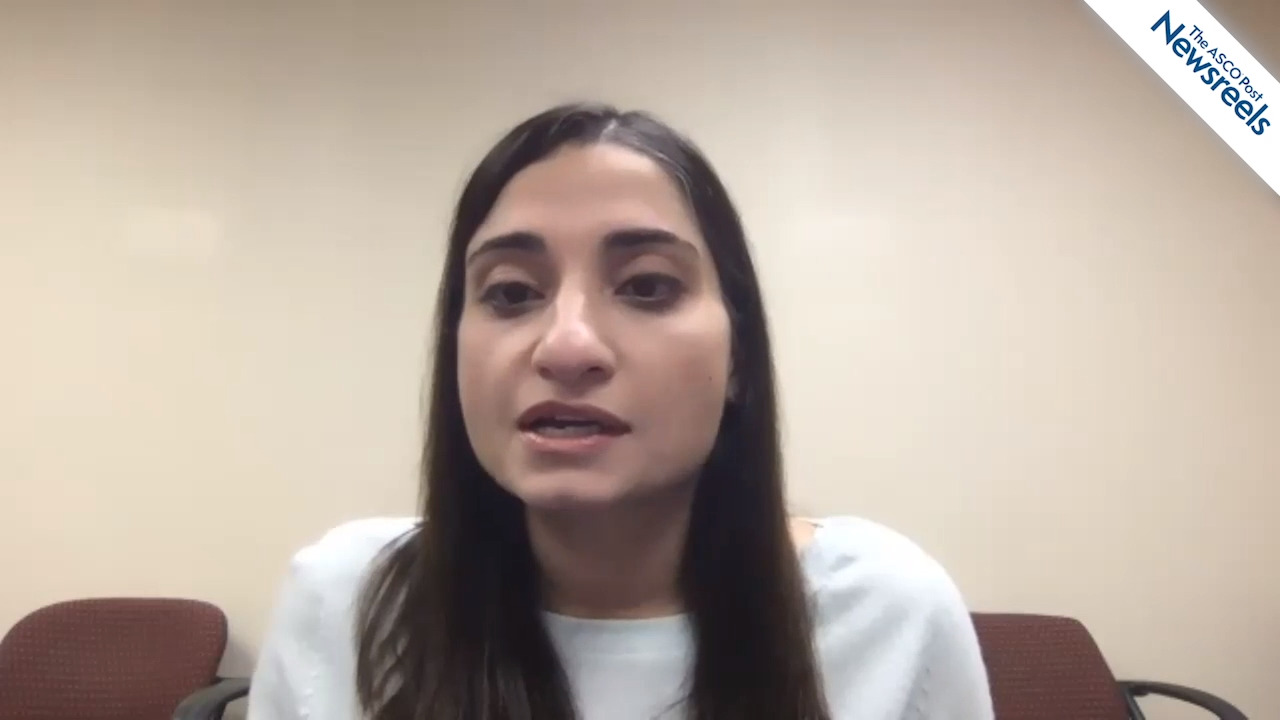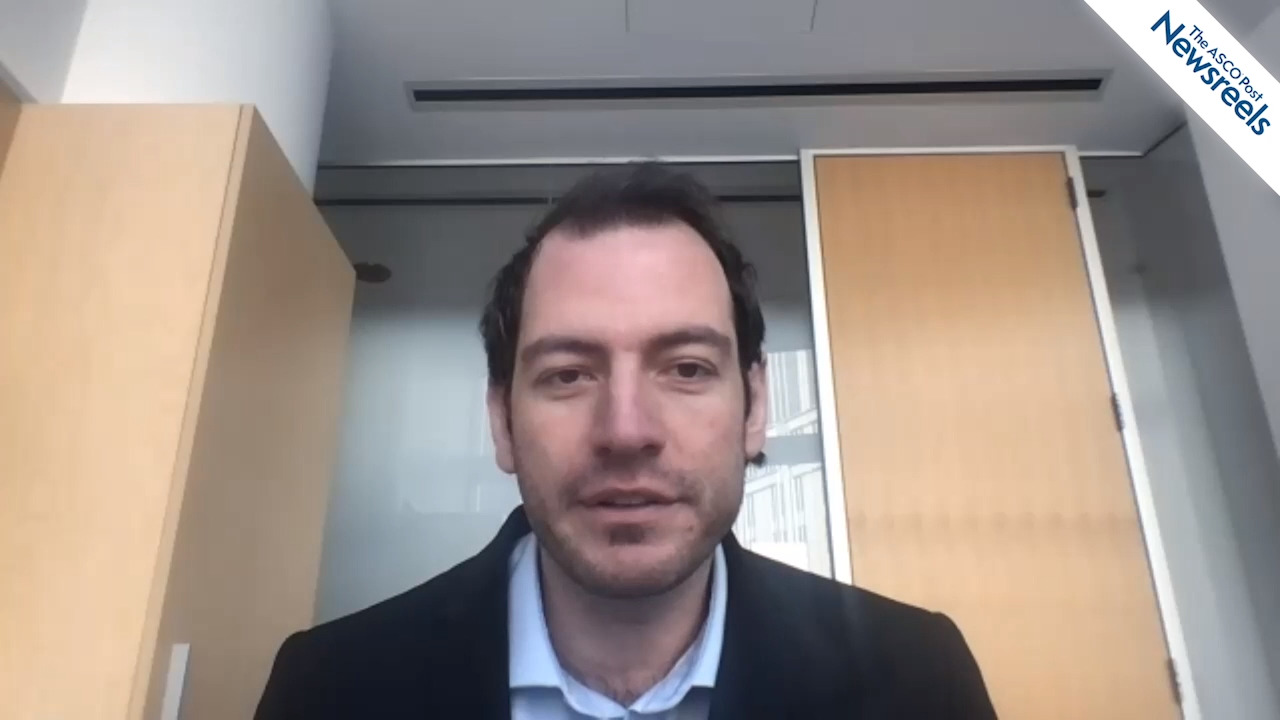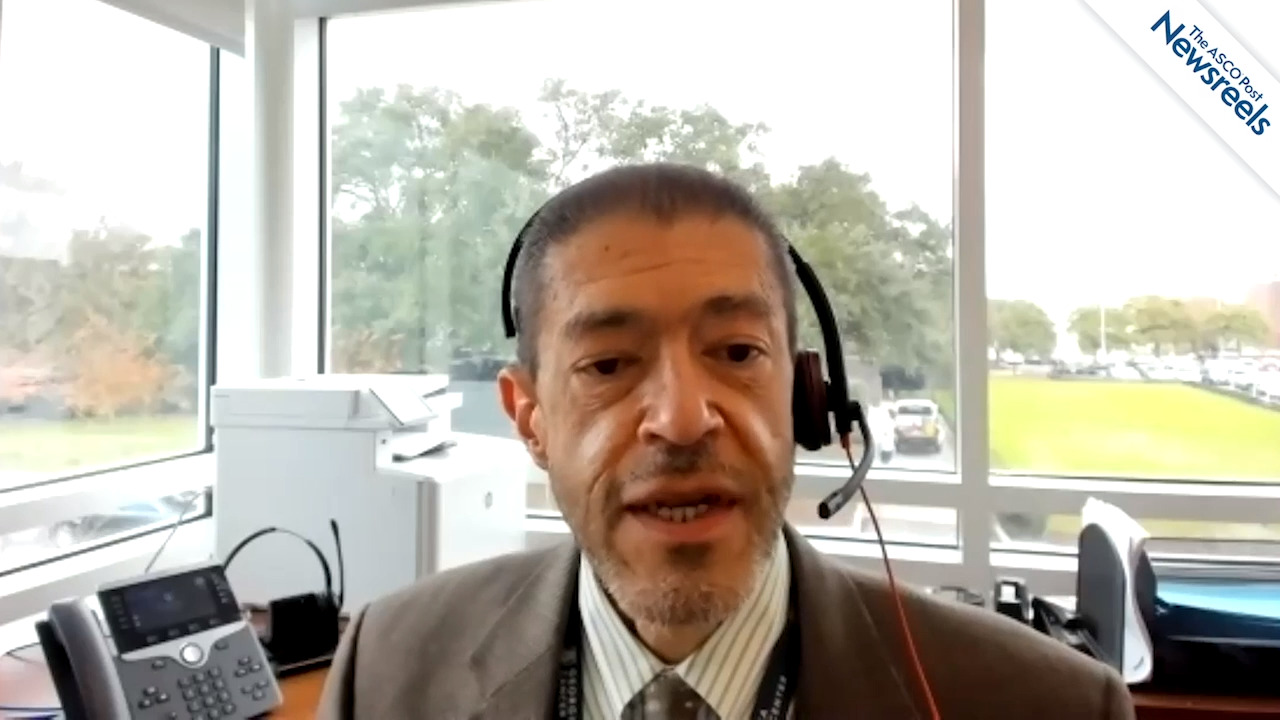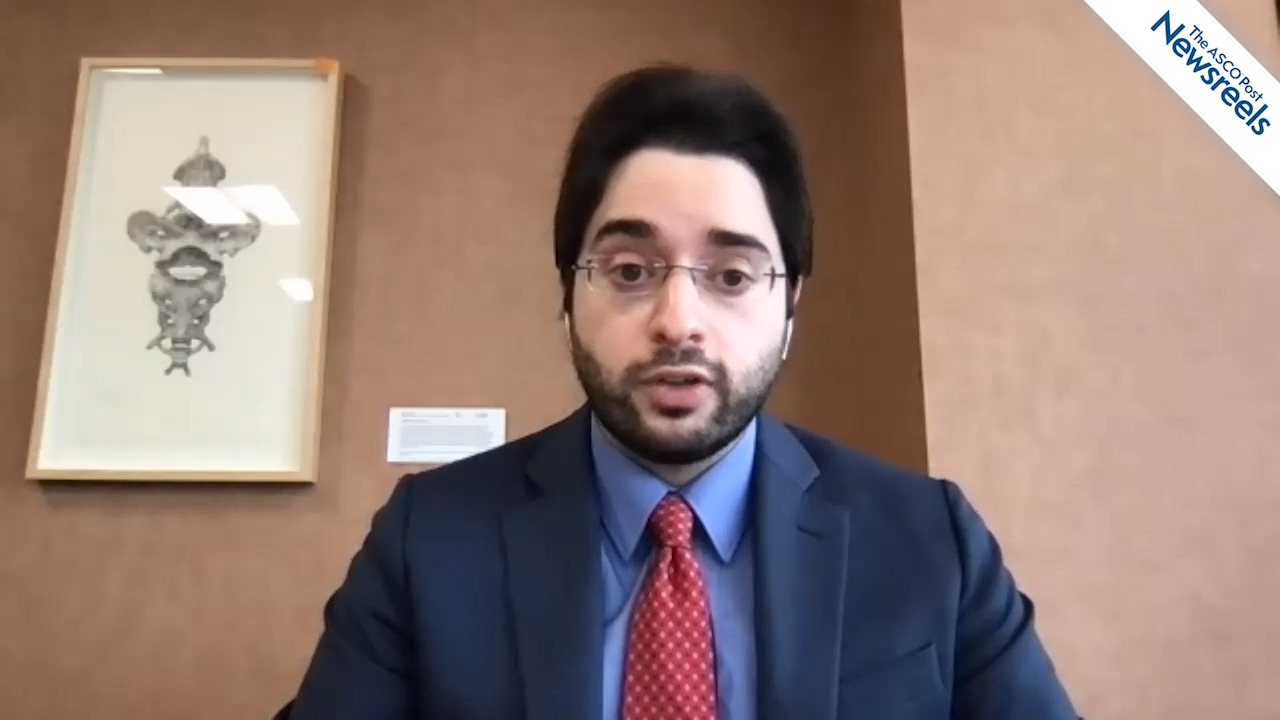Jennifer R. Brown, MD, PhD, on Managing Chronic Lymphocytic Leukemia/Small Lymphocytic Lymphoma
Jennifer R. Brown, MD, PhD, of Dana-Farber Cancer Institute, discusses treatment choices for patients with relapsed or refractory CLL/SLL, when to stop therapy due to adverse events, BTK inhibitors and their second-generation counterparts, the need for ways to manage disease progression on novel drugs, and minimal residual disease as a predictor of response.
Diet and Exercise Intervention May Increase Efficacy of Chemotherapy in Pediatric Patients With Leukemia
Research published by Orgel et al in the journal Blood Advances showed that restricting calories, reducing fat and sugar intake, and increasing physical activity may boost the effectiveness of chemotherapy for older children and adolescents with leukemia. This intervention, which improved...
Addition of Pegaspargase Intensification to Standard Low-Intensity Chemotherapy Backbone in Pediatric Low-Risk B-Cell ALL
In an analysis from the Children’s Oncology Group (COG) AALL0331 trial reported in the Journal of Clinical Oncology, Mattano et al found that the addition of pegaspargase intensification did not improve the high rate of continuous complete remission achieved with a standard COG low-intensity...
Alexander E. Perl, MD, on Acute Myeloid Leukemia: Treatment Updates
Alexander E. Perl, MD, of the Abramson Cancer Center at the University of Pennsylvania, discusses the major changes in 2021 to the NCCN Clinical Practice Guidelines in Oncology for managing acute myeloid leukemia, including venetoclax plus azacitidine, a new standard of care in patients ineligible for intensive induction; oral azacitidine maintenance in fit patients unable to complete intensive consolidation chemotherapy or proceed to transplant; and an increased focus on minimal residual disease status post-induction.
FDA Approves New Indication for Daunorubicin/Cytarabine: Secondary AML in Pediatric Patients
On March 30, the U.S. Food and Drug Administration (FDA) approved a revised label for the combination of daunorubicin and cytarabine (Vyxeos) to include a new indication to treat newly diagnosed therapy-related acute myeloid leukemia (AML) or AML with myelodysplasia-related changes (AML-MRC) in...
Groundbreaking Cancer Researcher Brian J. Druker, MD, Shows No Signs of Slowing Down
For this installment of the Living a Full Life series, guest editor Jame Abraham, MD, spoke with physician-scientist Brian J. Druker, MD, Director of the Knight Cancer Institute at Oregon Health & Science University, Portland. In 2009, Dr. Druker won the Lasker-DeBakey Clinical Medical Research ...
Noncovalent BTK Inhibitor Pirtobrutinib in Relapsed or Refractory B-Cell Malignancies
In the phase I/II BRUIN trial reported in The Lancet, Anthony R. Mato, MD, and colleagues found that the noncovalent Bruton’s tyrosine kinase (BTK) inhibitor pirtobrutinib produced durable responses in patients with relapsed or refractory B-cell malignancies, including those previously treated with ...
Whole-Genome Sequencing vs Cytogenetic Analysis in Myeloid Cancers
In a study reported in The New England Journal of Medicine, Duncavage et al found that whole-genome sequencing in patients with acute myeloid leukemia (AML) or myelodysplastic syndromes (MDS) provided rapid genomic profiling that improved diagnostic yield vs conventional cytogenetic analysis, as...
Study Identifies Factors That May Lower the Risk of CNS Relapse in Pediatric Patients With ALL
Starting chemotherapy several days before the first lumbar puncture for diagnosis and treatment of acute lymphoblastic leukemia (ALL) may reduce the risk of central nervous system (CNS) relapse in children, according to a study published by Tang et al in the journal Blood. The research focused on...
Responses to Conjugate Pneumococcal Vaccine in Patients With Chronic Lymphocytic Leukemia
In an Italian study reported in Leukemia, Mauro et al found that only a small minority of patients with chronic lymphocytic leukemia (CLL) developed an adequate immune response to pneumococcal vaccination, with response being more likely in patients who were younger, had previously untreated and...
Studies Provide Guidance on the Use of Blinatumomab in Pediatric Acute Lymphoblastic Leukemia
Monotherapy with blinatumomab as consolidation therapy before allogeneic stem cell transplant appears to be the optimal treatment for children with high-risk first-relapse B-cell precursor acute lymphoblastic leukemia (ALL), according to an international phase III trial that compared this approach...
Eprenetapopt Plus Azacitidine in TP53-Mutated MDS and AML
In a Groupe Francophone des Myélodysplasies phase II study reported in the Journal of Clinical Oncology, Cluzeau et al found that the combination of eprenetapopt and azacitidine produced high response rates in previously untreated patients with high-risk TP53-mutated myelodysplastic syndromes (MDS) ...
Preclinical Research Shows Activity of Fidaxomicin Combination Therapy in MLL-AML
A specific type of acute myeloid leukemia (AML) that contains a rearrangement in the MLL gene (also known as KMT2A) might be made more sensitive to chemotherapy using an antibiotic currently available to treat diarrhea, according to new research published by Zeisig et al in Science Translational...
Genome-Edited Donor-Derived Anti-CD19 CAR T-Cell Therapy Is Active in B-Cell Acute Lymphoblastic Leukemia
Pooled results of two phase I studies, reported in The Lancet by Reuben Benjamin, MBBS, of the Department of Haematological Medicine, King’s College Hospital, London, and colleagues, indicate that the genome-edited donor-derived allogeneic anti-CD19 chimeric antigen receptor (CAR) T-cell product...
Novel Approaches in Chronic Lymphocytic Leukemia
To complement The ASCO Post’s continued comprehensive coverage of the 2020 American Society of Hematology (ASH) Annual Meeting & Exposition, here are several abstracts selected from the meeting proceedings focusing on novel therapeutic approaches in chronic lymphocytic leukemia (CLL). For full...
Chemotherapy-Induced ‘Dormancy’ in AML Allows Cancer Cell Survival, May Contribute to Relapse
Researchers have identified a cellular resilience mechanism through which acute myeloid leukemia (AML) cells survive cancer treatment and repopulate, leading to disease relapse. The research, published by Cihangir Duy, PhD, MS, and colleagues in Cancer Discovery, also suggests that certain drugs...
Treatment With LOXO-305 Results in Durable Efficacy in Heavily Pretreated Patients With CLL/SLL
Despite the marked efficacy of ibrutinib, acalabrutinib, and venetoclax in chronic lymphocytic leukemia/small lymphocytic lymphoma (CLL/SLL), treatment failure can occur through the development of resistance. In addition, patients in whom Bruton’s tyrosine kinase (BTK) inhibitors and BCL2...
Novel Therapies and New Indications for Use in Treatment of Hematologic Malignancies
Selinexor: On December 18, 2020, the U.S. Food and Drug Administration (FDA) approved selinexor (Xpovio) in combination with bortezomib (Velcade) and dexamethasone for the treatment of adult patients with multiple myeloma who have received at least one prior therapy. Venetoclax: On October 16,...
Chemotherapy Plus Blinatumomab for Philadelphia Chromosome–Negative B-Cell ALL
Results from a phase II study presented by Nicholas J. Short, MD, and colleagues at the 2020 American Society of Hematology (ASH) Annual Meeting & Exposition showed that first-line treatment with a regimen of chemotherapy combined with the monoclonal antibody blinatumomab resulted in increased...
Study Finds Survival Disparities and Mutational Differences for Black Patients Younger Than 60 With AML
It has been well documented that, collectively, Black individuals have the highest death rates and shortest survival of any racial/ethnic group in the United States for most cancers. Black men also have the highest cancer incidence.1 Although the causes of these inequities are complex and include...
Study Finds Asciminib Safer, More Effective Than Bosutinib in Chronic-Phase CML
Since the introduction of imatinib almost 18 years ago, similar next-generation tyrosine kinase inhibitors have been approved for chronic myeloid leukemia (CML), including dasatinib, nilotinib, bosutinib, and ponatinib. These drugs attack a similar target, making it more likely that resistance to...
ASH 2020 Meeting Highlights
The world of hematologic malignancies continues to move forward at a robust pace despite the challenges of the COVID era. Although some areas of clinical trials and basic research suffered short-term stoppages or delays due to the pandemic, the studies presented at the 2020 American Society of...
Genetic Mutations Linked to Worse B-Cell ALL Outcomes in Pediatric Hispanic and Latino Patients
A combination of genetic mutations may explain the higher incidence of and poorer outcomes from pediatric leukemia in Hispanic and Latino patients, according to a new study published by Raca et al in the journal Leukemia. Researchers said a novel therapeutic drug combination—as well as testing for...
FDA Pipeline: Breakthrough Designations in CML and for Cachexia, EUA for COVID-19
Recently, the U.S. Food and Drug Administration (FDA) issued a Breakthrough Therapy designation to asciminib for chronic myeloid leukemia (CML); a Breakthrough Device designation to an assay designed to help select patients with cachexia for treatment with an investigational therapeutic; and an...
Improvement in Patient-Reported Outcomes After Stopping Tyrosine Kinase Inhibitor Therapy for Chronic Myeloid Leukemia
In the prospective LAST study reported in JAMA Oncology, Ehab Atallah, MD, and Kathryn Flynn, PhD, of the Medical College of Wisconsin, Milwaukee, and colleagues, found that stopping tyrosine kinase inhibitor therapy in patients with chronic myeloid leukemia (CML) was associated with the...
MURANO Trial: Venetoclax Plus Rituximab Achieves Durable Progression-Free Survival in Resistant CLL
Patients with relapsed or refractory chronic lymphocytic leukemia (CLL) treated with the combination of fixed-duration venetoclax/rituximab had a longer overall survival and progression-free survival at 5 years compared with those treated with bendamustine/rituximab, according to a 5-year analysis...
Preemptive Tocilizumab for Cytokine-Release Syndrome in Pediatric Patients With B-Cell ALL Receiving CAR T-Cell Therapy
In a single-institution study reported in the Journal of Clinical Oncology, Kadauke et al found that risk-adapted tocilizumab reduced the expected incidence of grade 4 cytokine-release syndrome in pediatric patients receiving CD19-directed chimeric antigen receptor (CAR) T-cell...
Expert Point of View: Marlise Luskin, MD
Commenting on this trial, Marlise Luskin, MD, of Dana-Farber Cancer Institute, Boston, explained that the treatment of AML in older adults remains a particular challenge for leukemia clinicians. “Although many older patients eligible for intensive induction chemotherapy achieve complete remission,...
Oral Azacitidine Is Noninferior to Placebo for Health-Related Quality of Life in AML
Health-related quality of life was sustained in patients taking oral azacitidine (also known as CC-486) compared with placebo in patients with acute myeloid leukemia (AML), according to results of the phase III QUAZAR AML-001 trial reported at the 2020 American Society of Hematology (ASH) Annual...
Reduced Frequency of Vincristine/Dexamethasone Pulses in Maintenance Therapy for Pediatric Patients With Average-Risk B-Cell ALL
As reported in the Journal of Clinical Oncology by Angiolillo et al, findings from the phase III Children’s Oncology Group (COG) AALL0932 trial indicated that “outstanding outcomes” can be achieved with maintenance therapy with a reduced frequency of vincristine/dexamethasone pulses in pediatric...
Maintenance Oral Azacitidine for Patients With AML in First Remission: QUAZAR AML-001 Trial
As reported in The New England Journal of Medicine by Andrew H. Wei, MBBS, PhD, and colleagues, the phase III QUAZAR AML-001 trial has shown prolonged overall survival with oral azacitidine maintenance therapy vs placebo in patients with acute myeloid leukemia (AML) in first remission. The oral...
Intensified Reduced-Intensity Conditioning for Allogeneic Stem Cell Transplantation in AML or MDS
In the phase II FIGARO trial reported in the Journal of Clinical Oncology, Craddock et al found that intensified reduced-intensity conditioning with fludarabine/amsacrine/cytarabine–busulfan (FLAMSA-Bu) did not improve outcomes following allogeneic stem cell transplantation vs standard...
Sara Zarnegar-Lumley, MD, on AML: Prognostic Effects of IDH Mutations
Sara Zarnegar-Lumley, MD, of Vanderbilt University Medical Center, discusses an analysis of a large cohort confirming the age-associated prevalence of IDH mutations in patients, across the age spectrum, with acute myeloid leukemia and therapeutic implications. IDH-mutated genes were found to co-occur frequently with other mutations, some of which favorably impact outcomes in patients younger than 60 (Abstract 388).
Three vs Four Courses of Chemotherapy in Younger Patients With AML
As reported in the Journal of Clinical Oncology by Burnett et al, findings from the phase III MRC AML17 trial indicated that four courses of chemotherapy, compared to three courses, reduced the cumulative incidence of relapse and improved relapse-free survival, but not overall survival, in younger...
Total-Body Irradiation/Etoposide vs Chemotherapy Conditioning Before Stem Cell Transplant for Pediatric Patients With ALL
As reported in the Journal of Clinical Oncology by Peters et al, the phase III FORUM trial showed superior overall survival with total-body irradiation plus etoposide vs combination chemoconditioning in pediatric patients with acute lymphoblastic leukemia (ALL) undergoing allogeneic hematopoietic...
Christian Marinaccio, PhD Candidate: Genetic Driver May Play a Role in Progression of Myeloproliferative Neoplasms to AML
Christian Marinaccio, PhD Candidate, of Northwestern University, describes research he is conducting in the laboratory of John D. Crispino, PhD, which shows the loss of the tumor suppressor gene LKB1/STK11 facilitates progression of myeloproliferative neoplasms to acute myeloid leukemia (Abstract 1).
Use of a Novel CAR T-Cell Therapy in Pediatric and Adult Patients With Advanced B-Cell ALL
Pooled results of two phase I studies, reported in The Lancet by Benjamin et al, indicate that the genome-edited, donor-derived allogeneic anti-CD19 chimeric antigen receptor (CAR) T-cell product UCART19 is active and has a manageable toxicity profile in pediatric and adult patients with relapsed...
Integrated Palliative and Oncology Care for Patients Receiving Treatment for AML
In a study reported in JAMA Oncology, Areej El-Jawahri, MD, and colleagues found that integrated palliative and oncology care was associated with better quality of life vs usual care among patients receiving treatment for acute myeloid leukemia (AML). The investigators stated, “Patients with AML...
Fixed-Duration First-Line Ibrutinib Plus Venetoclax Yields Treatment-Free Remission in Some Patients With CLL
The randomized phase II CAPTIVATE trial showed that a fixed-duration treatment approach with 12 cycles of ibrutinib and venetoclax as first-line therapy for chronic lymphocytic leukemia (CLL) achieved a 30-month progression-free survival of more than 95% in patients with undetectable minimal...
Disparities in Socioeconomic Status, Treatment Complications, and Obesity Impact Outcomes in Minority Patients With AML
A study by Ivy Abraham, MD, of the University of Illinois at Chicago, and colleagues, investigated the contribution of structural violence, specifically neighborhood socioeconomic status, on the racial/ethnic differences in the survival of patients with acute myeloid leukemia (AML). They found that ...
FDA Approves Rituximab-arrx, a Biosimilar to Rituximab
On December 17, the U.S. Food and Drug Administration (FDA) approved rituximab-arrx (Riabni), a biosimilar to rituximab (Rituxan), for the treatment of adult patients with non-Hodgkin lymphoma, chronic lymphocytic leukemia, granulomatosis with polyangiitis (Wegener's granulomatosis), and...
Study Finds Survival Disparities and Mutational Differences for Black Patients Younger Than 60 With AML
It has been well documented that, collectively, Black individuals have the highest death rates and shortest survival of any racial/ethnic group in the United States for most cancers. Black men also have the highest cancer incidence.1 Although the causes of these inequities are complex and include...
Nitin Jain, MD, on B-Cell ALL: Expert Perspective on Key CAR T-Cell Treatment Advances
Nitin Jain, MD, of The University of Texas MD Anderson Cancer Center, reviews six important abstracts on CAR T-cell treatments for B-cell acute lymphoblastic leukemia (ALL): successful 24-hour manufacture of CAR T-cell therapy; ALLCAR19, a novel fast-off rate therapy; donor-derived CD19-targeted treatment; CAR 2.0 therapy to manage post-transplant relapse; UCART22, allogeneic engineered T cells expressing anti-CD22 chimeric antigen receptor; and inotuzumab ozogamicin in pediatric CD-22–positive disease (Session 614, Abstracts 159-164).
Farhad Ravandi, MD, on AML: Novel Combination Therapies for Newly Diagnosed Disease
Farhad Ravandi, MD, of The University of Texas MD Anderson Cancer Center, offers his expert perspective on key treatment studies in acute myeloid leukemia on the use of gilteritinib, consolidation chemotherapy, venetoclax, cladribine, azacitidine, quizartinib, decitabine, and CPX-351 (Session 616 [Abstracts 24- 29]).
Jorge E. Cortes, MD, on CML: Expert Perspective on Key ASH Abstracts
Jorge E. Cortes, MD, of the Georgia Cancer Center at Augusta University, reviews four important studies of treatment advances in chronic myeloid leukemia (CML): nilotinib vs dasatinib in newly diagnosed disease; final 5-year results from the BFORE trial on bosutinib vs imatinib for chronic phase (CP) CML; data from the OPTIC trial on ponatinib for CP-CML; and a novel class of mutated cancer-related genes associated with the Philadelphia translocation (Abstracts 45, 46, 48, 49).
Hassan Awada, MD, on AML and Machine Learning: Improving Prognostication
Hassan Awada, MD, of the Taussig Cancer Institute, Cleveland Clinic Foundation, discusses the use of newer machine-learning techniques to help decipher a set of prognostic subgroups that could predict survival, thus potentially improving on traditional methods and moving acute myeloid leukemia into the era of personalized medicine (Abstract 34).
What Is the Measure of Minimal Residual Disease in AML?
Relapse is the primary obstacle to cure in leukemia. The term minimal residual disease (MRD) was coined in the early 1990s to describe finding a disease-specific marker in the context of a morphologic-appearing remission. The technique first used for MRD detection was the Southern blot (!), but the ...
Meta-analysis Shows Superior Disease-Free and Overall Survival With Measurable Residual Disease Negativity in AML
In a systematic review and meta-analysis reported in JAMA Oncology, Nicholas J. Short, MD, of The University of Texas MD Anderson Cancer Center, and colleagues, found that measurable residual disease (MRD) negativity is associated with superior disease-free and overall survival in patients with...
Front-Line Nonchemotherapy Regimens May Improve Long-Term Outcomes in CLL
An assortment of agents has been approved in the United States for the first-line treatment of chronic lymphocytic leukemia (CLL), and all of them are effective, explained Richard Furman, MD, of Weill-Cornell Medical College, NewYork-Presbyterian Hospital, New York. In the modern era, most patients ...
Matthew S. Davids, MD, on CLL/SLL: New Data on Ibrutinib, Venetoclax, and Rituximab Therapies
Matthew S. Davids, MD, of Dana-Farber Cancer Institute, summarizes three key studies from a session he co-moderated on ibrutinib plus venetoclax for first-line treatment of patients with chronic lymphocytic leukemia (CLL) and small lymphocytic lymphoma (SLL), long-term responses to these agents for relapsed and refractory CLL, and undetectable minimal residual disease following fixed-duration treatment with venetoclax and rituximab for CLL (Abstracts 123, 124, and 125).
